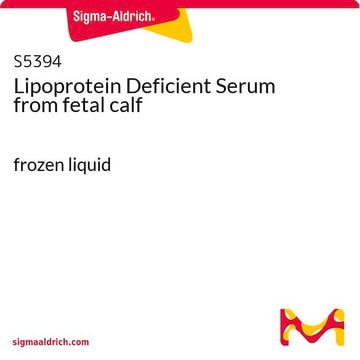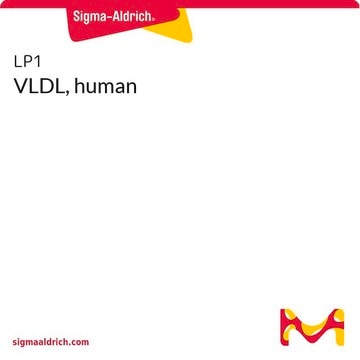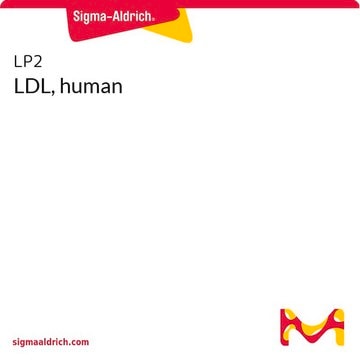LP4
Lipoprotein Deficient Serum, human, 100 mg
LPDS is isolated from fresh human serum by isopycnic ultracentrifugation, and is used for blocking of interfering antibodies.
Synonim(y):
LPDS
Zaloguj sięWyświetlanie cen organizacyjnych i kontraktowych
About This Item
Kod UNSPSC:
41105901
eCl@ss:
26020100
NACRES:
NA.41
Polecane produkty
Opis ogólny
LPDS is isolated from fresh human serum by isopycnic ultracentrifugation at the lower and upper density limits of the specified density range (Havel et al., 1955). Density adjustments are performed with solid KBr.
Concentration: 35 mg/mL
Source: Fresh human plasma. Tested negative for HBsAg and antibodies to HIV-I, HIV-II and Hepatitis C.
Concentration: 35 mg/mL
Source: Fresh human plasma. Tested negative for HBsAg and antibodies to HIV-I, HIV-II and Hepatitis C.
Jakość
QUALITY ASSURANCE:
Protein determined by the Pierce BCA method with BSA as the standard. Purity of each preparation is verified by agarose gel electrophoresis using Fat Red 7B staining for lipid (2,3).
Protein determined by the Pierce BCA method with BSA as the standard. Purity of each preparation is verified by agarose gel electrophoresis using Fat Red 7B staining for lipid (2,3).
Postać fizyczna
Dulbecco′s PBS, pH 7.0, without Ca 2+. Filtered through a 0.22 micron filter. Not guaranteed sterile.
Przechowywanie i stabilność
LPDS may be stored frozen and is quite stable. Cell culture medium containing 3-5 mg/mL of LPDS is approximately equivalent to medium containing 10% Fetal Bovine Serum.
Informacje prawne
CHEMICON is a registered trademark of Merck KGaA, Darmstadt, Germany
Oświadczenie o zrzeczeniu się odpowiedzialności
RESEARCH USE ONLY. This product is regulated in France when intended to be used for scientific purposes, including for import and export activities (Article L 1211-1 paragraph 2 of the Public Health Code). The purchaser (i.e. enduser) is required to obtain an import authorization from the France Ministry of Research referred in the Article L1245-5-1 II. of Public Health Code. By ordering this product, you are confirming that you have obtained the proper import authorization.
Unless otherwise stated in our catalog or other company documentation accompanying the product(s), our products are intended for research use only and are not to be used for any other purpose, which includes but is not limited to, unauthorized commercial uses, in vitro diagnostic uses, ex vivo or in vivo therapeutic uses or any type of consumption or application to humans or animals.
Kod klasy składowania
12 - Non Combustible Liquids
Klasa zagrożenia wodnego (WGK)
WGK 1
Temperatura zapłonu (°F)
Not applicable
Temperatura zapłonu (°C)
Not applicable
Certyfikaty analizy (CoA)
Poszukaj Certyfikaty analizy (CoA), wpisując numer partii/serii produktów. Numery serii i partii można znaleźć na etykiecie produktu po słowach „seria” lub „partia”.
Masz już ten produkt?
Dokumenty związane z niedawno zakupionymi produktami zostały zamieszczone w Bibliotece dokumentów.
Klienci oglądali również te produkty
The role of class II molecules in human B cell activation. Association with phosphatidyl inositol turnover, protein tyrosine phosphorylation, and proliferation.
P J Lane,F M McConnell,G L Schieven,E A Clark,J A Ledbetter
Journal of immunology (Baltimore, Md. : 1950) (1950)
Effects of l-amphetamine on the central neurons of the snail.
S S Huang,Y C Chuang,Y H Chen,M C Tsai
General Pharmacology null
Isolation of a human anti-epidermal growth factor receptor Fab antibody, EG-19-11, with subnanomolar affinity from naive immunoglobulin repertoires using a hierarchical antibody library system.
Byung-ung Hur,Jae-bong Yoon,Li-Kun Liu,Sang-hoon Cha
Immunology Letters null
1Alpha,25-dihydroxyvitamin D3-mediated stimulation of steroid sulphatase activity in myeloid leukaemic cell lines requires VDRnuc-mediated activation of the RAS/RAF/ERK-MAP kinase signalling pathway.
Philip J Hughes,Geoffrey Brown
Journal of Cellular Biochemistry null
Differential localization and pH dependency of phosphoinositide 1,4,5-IP3, 1,3,4,5-IP4 and IP6 receptors in rat and human brains.
A Parent,R Quirion
The European Journal of Neuroscience null
Nasz zespół naukowców ma doświadczenie we wszystkich obszarach badań, w tym w naukach przyrodniczych, materiałoznawstwie, syntezie chemicznej, chromatografii, analityce i wielu innych dziedzinach.
Skontaktuj się z zespołem ds. pomocy technicznej








